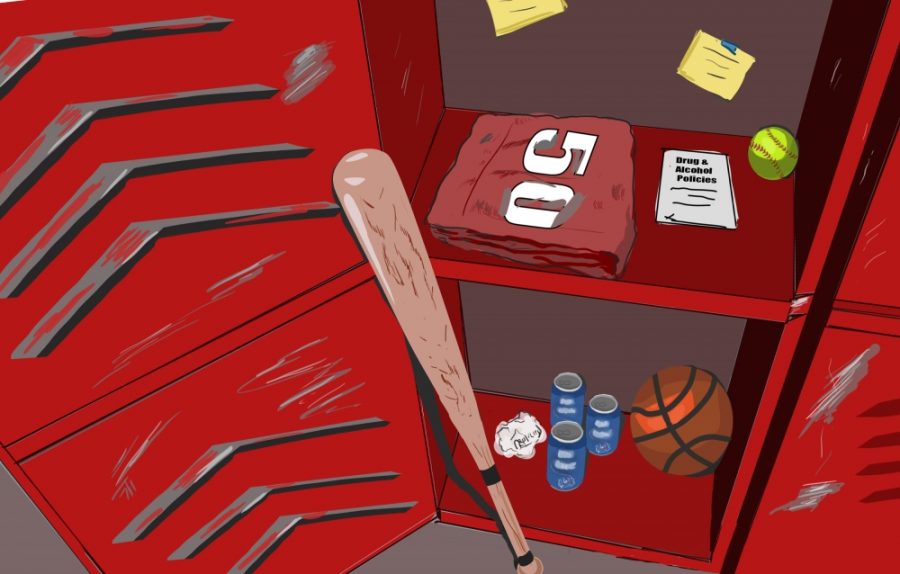As we move on from cold and rain to nicer weather, there will be no shortages of partying Chico State students. This narrative of a typical weekend is different for student-athletes who are bound by a drinking policy through the Department of Intercollegiate Athletics.
“We want people to have a good college experience, but we want them to be wise and make good choices and compete at their peak performance,” said Anita Barker, the Athletic Director at Chico State. Barker has been Athletic Director for the past 16 years and has also worked hard to improve the student-athlete experience at the university.
Part of being a student-athlete is adhering to the extra responsibilities placed upon them. These include representing the university appropriately, playing at their highest possible performance and being in good academic standing.
The administration at Chico State has recognized that although they understand college kids will be college kids, student-athletes are held to a higher standard than most of the other students at Chico State, thus requiring some type of policy on drinking.
The overall alcohol policy encompassing Chico State Athletics states that:
- Irresponsible or underage drinking is a risk to students’ academic, social, physical, emotional and legal welfare.
- The use of alcohol before, during or after department-sponsored athletic events either at home or during road trips is strictly prohibited.
- Chico State student-athletes may not consume alcohol during any “official team activity,” including receptions, dinners and special events.
- Student-athletes, coaches, or staff members shall not serve or provide alcohol to any prospective student-athlete, regardless of age, during an official visit, or while representing the department or university in any function.
- The irresponsible use of alcohol and/or being intoxicated in a public place, regardless of age, is prohibited.
- Head coaches may adopt more restrictive rules relative to alcohol use for their respective teams. In such an event, student-athletes on the team shall also comply with those rules or face possible disciplinary action.
The Chico State women’s soccer team created their own additional policy on alcohol in 2011. Their leadership team, consisting of captains as well as upperclassmen, decided that they would enforce a completely dry season. As a result, the team made it to the Division II Final Four competition this season.
“I think my team has the strictest policy on drinking,” said Kim Sutton, head coach for the Chico State women’s soccer team. “It includes athletes over the age of 21, everyone is held to the same standard.”
Sutton had been wanting to introduce having a dry season for a while but wanted the policy to come from the student-athletes themselves, not an authority figure. She knew that it would be more likely to be followed if her team as peers supported it.
“From the day we start the final games of the season, we do not tolerate any substance of alcohol whatsoever,” said Devon Morones, a midfielder on the women’s soccer team. “We get everyone on board and everyone is for it. We’re just here to do school and play soccer.”
The men’s basketball team has a similar self-governing policy like the women’s basketball team.
“We all came together and decided that we would hold each other accountable and enforce the policy among ourselves,” said Corey Silverstrom, a guard for the men’s basketball team. “We all just wanted to be focused for the season.”
While the women’s soccer team and men’s basketball team enforce their own policy, other teams in the athletic department have found different ways to enforce these policies.
“Each consequence is handled differently,” said Angel Shamblin, head coach for the Wildcats’ softball team. “It depends on the situation and exactly what happened with that situation.”
What an athlete does to break this policy can lead to some unfortunate consequences including sitting out a few games, suspension or even having a scholarship revoked, depending on the severity of the offense.
There is also a level of trust involved between players and coaches. Where the coaches can’t be monitoring the athletes at all time and they have to trust them to make the right decisions.
“I trust my guys. I think that’s how you got to be from the beginning for any coach,” said Nick Green, head coach of the men’s golf team at Chico State. “You have to have that mutual trust between your players and yourself.”
Trusting the athletes is important, but educating the athletes on what alcohol can do to your body is equally as important.
CADEC is Chico State’s Campus Alcohol and Drug Education Center. They are responsible for making sure students know the consequences of drinking or doing drugs.
“We have had someone from CADEC come talk to our team about the dangers of drugs and alcohol and also talk about the resources CADEC provides,” said men’s basketball coach Greg Clink, via email. “We also have a nutritionist come speak to our team regularly and part of that presentation is educating our student-athletes on the effects alcohol can have on athletic performance.”
Being educated about what alcohol can do to the body is important for student-athletes, not only for sports but in case of emergency as well.
“We really try to keep the environment safe, clean and fair for our student-athletes,” said Barker.
Having found the secret to success across the athletic board, the alcohol policy is here to stay. After all, safety first.
Andrew Baumgartner can be reached at sportseditor@theorion.com or @abaum94 on Twitter.
Courtney Chapman can be reached at sportseditor@theorion.com or @courtneychaps on Twitter.






